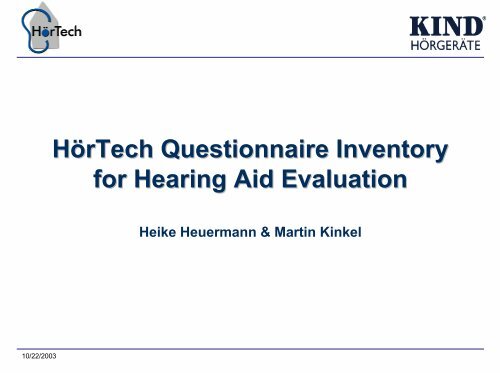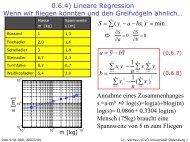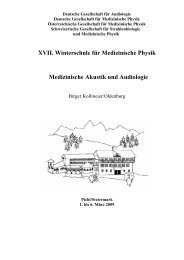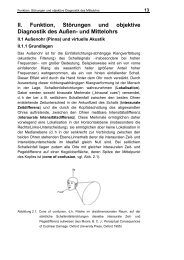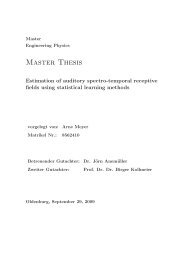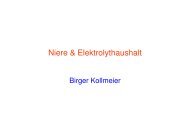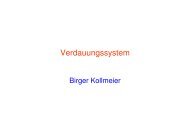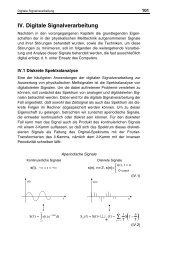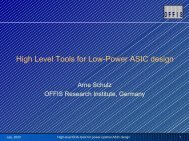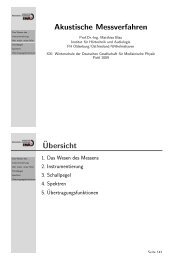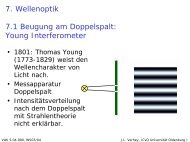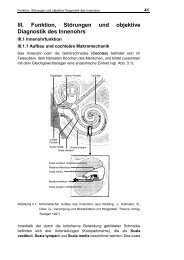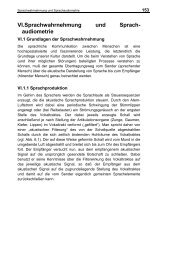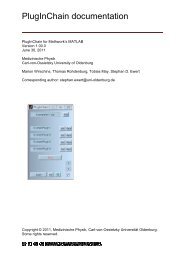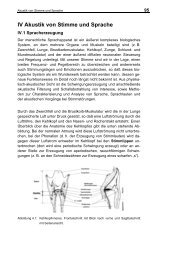HörTech Questionnaire Inventory for Hearing Aid Evaluation
HörTech Questionnaire Inventory for Hearing Aid Evaluation
HörTech Questionnaire Inventory for Hearing Aid Evaluation
Create successful ePaper yourself
Turn your PDF publications into a flip-book with our unique Google optimized e-Paper software.
10/22/2003<br />
<strong>HörTech</strong> <strong>Questionnaire</strong> <strong>Inventory</strong><br />
<strong>for</strong> <strong>Hearing</strong> <strong>Aid</strong> <strong>Evaluation</strong><br />
Heike Heuermann & Martin Kinkel
10/22/2003<br />
What do we want to know?<br />
1. How can we classify the physiological and<br />
psychosocial consequences of hearing<br />
loss?<br />
2. How can we measure the benefit from and<br />
individual satisfaction with hearing aids?
10/22/2003<br />
Functional states<br />
associated with health
10/22/2003<br />
WHO’s international classification<br />
of functioning and disability<br />
• Body function (“impairment” scale)<br />
– loss of function of body/organ<br />
– here: hearing impairment due to loss of hair cells or damage<br />
in the auditory pathway<br />
• Activities at the individual level (“disability” scale)<br />
– any limitation to per<strong>for</strong>m an activity within a “normal” range<br />
– here: restricted hearing/listening in various specific situations<br />
• Participation in society (“handicap” scale)<br />
– restricted fulfilment of a social role that would be normal <strong>for</strong> a<br />
given individual (considering age, gender, education,...)<br />
– here: isolation from public life due to hearing loss
10/22/2003<br />
WHO’s international classification<br />
of functioning and disability<br />
• Body function (“impairment” scale)<br />
→ audiogram, loudness scaling<br />
(→ speech tests)<br />
• Activities at the individual level (“disability” scale)<br />
→ client oriented questionnaires on hearing/listening ability<br />
in various situations<br />
• Participation in society (“handicap” scale)<br />
→ client oriented questionnaires on social participation and<br />
general quality of life
10/22/2003<br />
Measuring benefit and<br />
individual satisfaction
10/22/2003<br />
Measurement tools<br />
used by <strong>HörTech</strong><br />
• “Objective” compensation of hearing loss<br />
→ adaptive loudness scaling<br />
→ OLSA (Oldenburg Sentence Test)<br />
• Perceived compensation of disability and handicap<br />
(dependent on personality type, cognitive capabilities, ...)<br />
→ Oldenburg <strong>Inventory</strong><br />
→ IOI-HA (International Outcome <strong>Inventory</strong> <strong>for</strong> <strong>Hearing</strong> <strong>Aid</strong>s)<br />
→ Quality of Life (QoL) measures<br />
• HA characteristics (handling, sound quality, battery capacity,...)<br />
→ questionnaire “<strong>Hearing</strong> <strong>Aid</strong> <strong>Evaluation</strong>”
10/22/2003<br />
(new) Oldenburg <strong>Inventory</strong><br />
Various hearing and listening situations:<br />
• 3 open questions (most important situations)<br />
• 5 questions concerning hearing in quiet<br />
• 5 questions concerning hearing in noise<br />
• 3 questions concerning directional hearing<br />
• How well can you listen/hear in these situations?<br />
• How much ef<strong>for</strong>t does listening/hearing take?<br />
• all questions with and without hearing aids
04.<br />
10/22/2003<br />
(new) Oldenburg <strong>Inventory</strong><br />
Sie sind mit mehreren Personen zusammen in einem Raum. Können Sie die<br />
Gespräche um Sie herum mühelos verstehen?<br />
immer oft manchmal selten nie<br />
ohne Hörgeräte <br />
mit Hörgeräten <br />
Wie anstrengend ist das Hören in dieser Situation für Sie?<br />
nicht sehr<br />
wenig<br />
wenig mittelgradig<br />
deutlich<br />
sehr extrem<br />
ohne Hörgeräte <br />
mit Hörgeräten <br />
Die Situation kenne ich nicht
10/22/2003<br />
International Outcome <strong>Inventory</strong><br />
<strong>for</strong> <strong>Hearing</strong> <strong>Aid</strong>s (IOI-HA) (IOI HA)<br />
• Short questionnaire about individual disability and<br />
handicap<br />
• Intended as additional tool to be combined with<br />
other inventories<br />
• Available in more than 20 languages
10/22/2003<br />
International Outcome <strong>Inventory</strong><br />
<strong>for</strong> <strong>Hearing</strong> <strong>Aid</strong>s (IOI-HA) (IOI HA)<br />
1. Hours of daily use?<br />
2. How much have the hearing aids helped?<br />
3. How much difficulty do you still have?<br />
4. Are the hearing aids worth the trouble?<br />
5. How much have the hearing difficulties<br />
affected the things you can do?<br />
6. How much do you think other people were<br />
bothered by your hearing difficulties?<br />
7. How much have the hearing aids changed your<br />
enjoyment of life?
10/22/2003<br />
<strong>Questionnaire</strong><br />
“<strong>Hearing</strong> <strong>Aid</strong> <strong>Evaluation</strong>”<br />
Questions concerning hearing aid characteristics:<br />
• design<br />
• handling<br />
• sound quality<br />
• wearing com<strong>for</strong>t<br />
• acclimatisation
10/22/2003<br />
<strong>Questionnaire</strong><br />
“<strong>Hearing</strong> <strong>Aid</strong> <strong>Evaluation</strong>”<br />
05. Wie gut kommen Sie mit den Hörgeräten zurecht?<br />
Auf- und<br />
Absetzen sehr gut gut mittel schlecht sehr schlecht<br />
Ein- und<br />
Ausstellen<br />
sehr gut gut mittel schlecht sehr schlecht<br />
Einstellen der<br />
Lautstärke sehr gut gut mittel schlecht sehr schlecht nicht<br />
vorhanden<br />
Programmwahl<br />
sehr gut gut mittel schlecht sehr schlecht nicht<br />
vorhanden<br />
Batteriewechsel<br />
sehr gut gut mittel schlecht sehr schlecht<br />
07. Wie ist der Tragekom<strong>for</strong>t der Hörgeräte?<br />
<br />
sehr gut gut mittel schlecht sehr schlecht<br />
08. Wie ist das Aussehen der Hörgeräte?<br />
<br />
sehr gut gut mittel schlecht sehr schlecht
10/22/2003<br />
First applications and results<br />
• So far used in post-hoc mailing campaigns, field tests,<br />
and regular fitting processes<br />
• The questionnaires in fact cover distinct aspects of<br />
perceived disability (Oldenburg <strong>Inventory</strong>) and<br />
handicap (IOI-HA)<br />
• Perceived value of the HA does not only depend on<br />
perceived benefit → “<strong>Hearing</strong> <strong>Aid</strong> <strong>Evaluation</strong>”<br />
• Time of application of the questionnaires has a crucial<br />
impact on the results
10/22/2003<br />
Complete <strong>HörTech</strong> <strong>Inventory</strong><br />
• Anamnesis → cause study, demographics<br />
• Immediate Acceptance (“Hörgeräte-Rundgang”, Stock et al.)<br />
→ general quality of hearing aid and fitting algorithm<br />
• Oldenburg <strong>Inventory</strong> (based on Holube & Kollmeier 1991)<br />
→ perceived benefit after several weeks of usage<br />
• IOI-HA (Cox et al. 2000)<br />
→ perceived benefit after several weeks of usage<br />
• <strong>Hearing</strong> <strong>Aid</strong> <strong>Evaluation</strong> → sound, handling, design<br />
• Equipment and Services → further indicators <strong>for</strong> customer<br />
satisfaction<br />
• Quality of Life <strong>Questionnaire</strong> (based on Nottingham Health Profile)<br />
→ impact of hearing aids on a customer’s psychosocial condition
10/22/2003<br />
Thank you very much<br />
<strong>for</strong> your attention<br />
Heike Heuermann, Martin Kinkel<br />
KIND Hörgeräte


